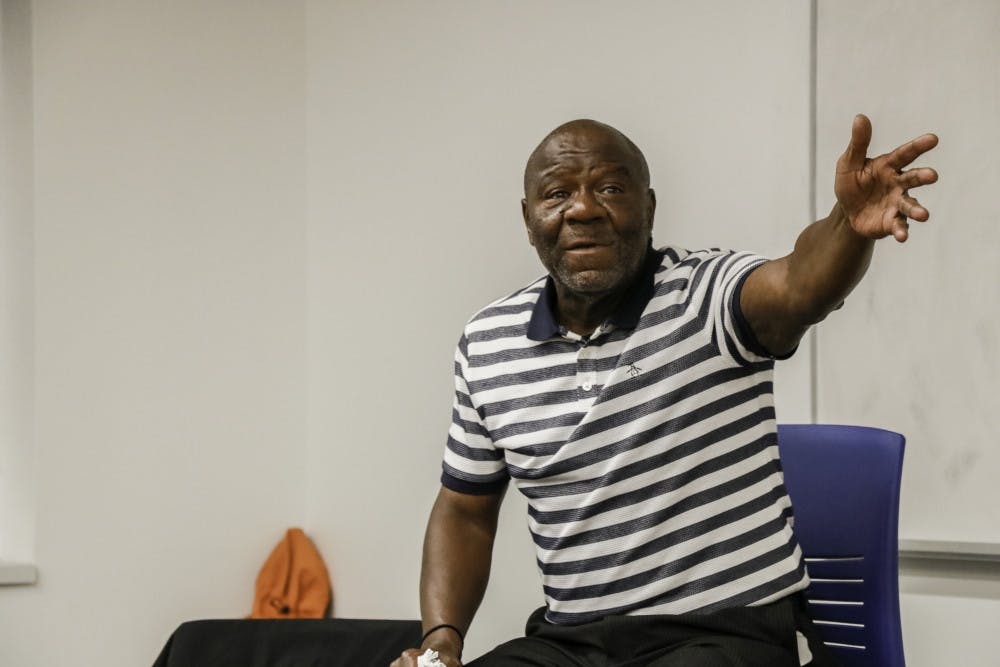By Miguel Gonzalez
News Editor
On an early spring day in March of 1975, an 8-year-old girl named Karen Smith was raped and murdered in the Bronx.
In an attempt to further the investigation into Smith’s murder, police brought 18-year-old David Bryant into custody. They questioned him for 11 hours, and gave him a document to sign.
While Bryant was told that the document permitted him an escort home, it was actually a confessional statement used to justify his arrest for the young girl’s rape and murder.
The next thing Bryant knew, his wrists were in handcuffs and he was sentenced to 25 years to life in prison.
Adjunct professor Mark Edwards met Bryant in 2014 while Bryant was blowing leaves outside of Edwards’ apartment in Princeton. After hearing Bryant’s story of being falsely convicted of rape and murder, Edwards asked Bryant, now 61, to share his side of the story.

On Sept. 25, Bryant was invited to the College to help host the lecture, “I Didn’t Do It: An Interview with David Bryant,” in the STEM Building Room 102.
Bryant’s escapades with the justice system unfortunately did not end after his release in April of 2013, which happened in part with legal support from Centurion Ministries, a non-profit organization based in Princeton that helps wrongly convicted prisoners seek release.
According to Edwards, Bryant’s newfound freedom was brief to say the least. Just 14 months later, a Manhattan federal judge involved in the case overturned the decision to release Bryant because Bryant’s first defense lawyer didn’t provide sufficient evidence such as blood tests, according to the Daily News.
He was sent back to prison until his second release in June of 2018. His running record with the New York justice system now totals 42 years.
After learning about Bryant’s return to prison, Edwards gave students in his first-year seminar course, “Imprisoned minds: philosophy and religion from jail,” an opportunity to write letters to him. Though a small act, Bryant appreciated the support from Edward’s students. Bryant’s own family members, including his parents, sister and brother, died while he was in prison.
“For you who had written to me in prison, even if you did for class, to write about that guy you see on the board, what a wrongful conviction could be like, what wrongful imprisonment could be like. The minute you sent that envelope in that box ... — you touch me!” Bryant said.
Edwards pointed to a photo of Bryant’s arrest. While surrounded by several officers. Bryant’s figure is hunched forward, wearing a wary expression, and his hands are folded behind his back.
Bryant said that all the officers in the photo were part of the investigation against him. He then pointed directly at himself, then a young man, in handcuffs.
“It touches me every time I see that picture,” Bryant said. “Because I know that was me when I was 18 years old. I’m 61 now.”
Bryant recalled the hostility surrounding the interrogation. According to Bryant, he made small talk with the officers without knowing their true intent.
During the trial, Bryant’s lawyer pressured him to admit to the murder in exchange for a shorter sentence –– eight to 20 years instead of life in prison. However, Bryant was not about to go down easily.
He continued to deny the crime until he was ultimately convicted and sentenced 25 years to life.
“I know I didn’t do anything wrong,” Bryant said. “I don’t kill no one. I’m not that kind of person and I will never be.”
Bryant emphasized that innocent people should never have to experience the horrors of prison.
“I can tell you this, only from experience, whether it be mine or be the millions, the millions, millions of people that I met through my years in prison,” Bryant said. “That’s not a place you want to live. Any of your life.”
Bryant feels as though his youth was taken from him, and wishes he could have back all the years now lost to him.
“This is an 18-year-old kid you see in a 61-year-old body,” Bryant said. “That’s what you see dressed. And it kills me to tell you that I lost all my life in prison. I want to be a kid. I want to be 18 again, but I can’t. No one is going to give it back to me.”
What kept Bryant chugging along during his years in prison was his self proclaimed faith in God, to whom he attributes all of his gratitude.
“Through all of this, He kept me alive,” Bryant said. “I’m alive. I’m still breathing. I can walk. I can see. I haven’t lost any limbs, fingers.”
Jessa Feinberg, a junior sociology major, was honored to meet Bryant after writing letters to him when she took Edwards’ course two years ago.
“Just meeting him in person and seeing the great person that he is in life –– it was more than I imagined,” Feinberg said. “Just him living beyond the expectation that I thought about him, it was a lot.”
Kyle Rich, a freshman criminology major and a current student in Edwards’ course, said that Bryant was an inspiration to him and other students
“It was a great inspiration to have a guy like this, who can give insight to a situation where he grew up convicted,” Rich said. “Even though he spent 42 years in prison, he didn’t blame anybody for anything. He lived his life the way it was.”
Bryant asked that people not feel sorry for him or pity him for his experiences.
He instead wants his story to be used as a lesson for others.
“Please, don’t feel sorry for me,” Bryant said. “I don’t feel sorry for me. I’m mad because I went through it, but I don’t feel sorry.”







